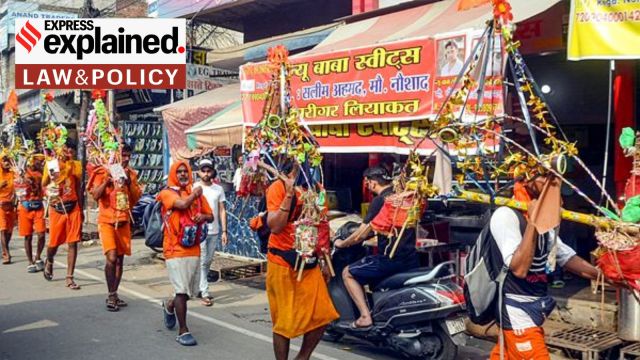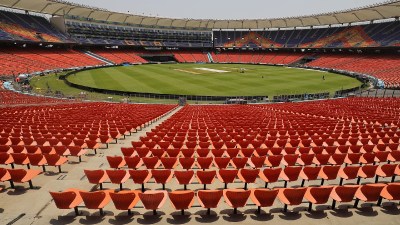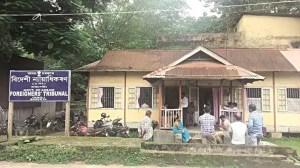Why has SC stayed police notice asking dhaba owners on Kanwar Yatra route to disclose their names?
Under what law did police act? Is it about privacy of shop owners and workers? Is the notice issued by police discriminatory? What questions does the case raise?
 Muzaffarnagar: Kanwariyas walk past the shops on which banners with shopkeepers' name were put up on Kanwar Marg after an order issued by Uttar Pradesh Government, in Muzaffarnagar, Saturday, July 20, 2024. (Photo - PTI)
Muzaffarnagar: Kanwariyas walk past the shops on which banners with shopkeepers' name were put up on Kanwar Marg after an order issued by Uttar Pradesh Government, in Muzaffarnagar, Saturday, July 20, 2024. (Photo - PTI)The Supreme Court on Monday (July 22) “prohibited the enforcement” of the public notice issued by police in Uttar Pradesh’s Muzaffarnagar district, directing hotels, dhabas, and shops on the route of the Kanwar Yatra to display the names of their owners and employees.
The order of the court will also apply to other states — police in Haridwar (Uttarakhand) and Ujjain (Madhya Pradesh) have issued similar directions.
The Muzaffarnagar Police notice, issued on July 17, says (translated) that while no “religious discrimination” is intended, “law-and-order situations” have arisen in the past after the names of shops “created confusion” among the Kanwariyas who follow a strictly vegetarian diet.
Several parties including Trinamool Congress Member of Parliament Mahua Moitra, Association for Protection of Civil Rights, Delhi University Professor Apoorvanand, and the former India head of Amnesty International Aakar Patel, challenged the direction on the ground that it targets Muslim-owned businesses by compelling individuals to reveal their religious identity.
The petitioners argued that this could have economic consequences and lead to businesses and individuals being targeted, and asked for the direction to be publicly withdrawn.
The Kanwar Yatra began on Monday (July 22) and will continue until August 19. Senior Advocates A M Singhvi, C U Singh, and Huzefa Ahmadi appeared on behalf of the petitioners. The state of Uttar Pradesh went unrepresented in court.
What are the takeaways from the hearing?
NO GOVERNMENT ORDER: The Bench of Justices Hrishikesh Roy and S V N Bhatti noted that there was no government order empowering the police to give directions in this case. In its order, the Bench observed that such directions could be issued under the Food Safety and Standards Act, 2006 or the Street Vendors Act, 2014 to ensure “shudh shakahari” (strictly vegetarian) food is served to the Kanwar Yatris.
LIMITS TO POLICE ACTION: The Bench said that even to take action under these Acts, “the powers of the competent authority cannot be usurped by the police, without legal foundation”. The directions issued by police said shops should “voluntarily display” the names of owners and employees; however, the court’s order took note of the petitioners’ submissions that “penal actions have been initiated against food business operators”.
QUESTION OF DISCRIMINATION: The court did not weigh in on arguments made by the petitioners on constitutional grounds. Singhvi argued that the directions discriminated against individuals on the grounds of religion, violating Article 15(1), and supported the practice of untouchability (banned under Article 17) by causing an economic boycott of establishments that hire people from backgrounds including Muslims and Dalits.
What is the legal basis for the directions issued by police?
The Muzaffarnagar Police have not mentioned any law in their directions to shopkeepers. As such, the Supreme Court will have to consider which law gives the police and state governments the authority to pass these directions.
Often in “urgent cases of nuisance or apprehended danger”, orders are passed under Section 144 of the Indian Penal Code, 1860 — reproduced in large part as Section 163 of the Bharatiya Nagarik Suraksha Sanhita, 2023.
This provision states that a Magistrate (empowered by the state government) can “direct any person to abstain from a certain act or to take certain order with respect to certain property in his possession or under his management”.
Such an order can be issued to prevent “obstruction, annoyance or injury to any person lawfully employed, or danger to human life, health or safety or a disturbance of the public tranquility, or a riot, or an affray”.
In 2012, the court placed certain guardrails around the exercise of power under Section 144 in the case ‘In Re: Ramlila Maidan Incident’. In February 2011, when the UPA government was in power, yoga guru Baba Ramdev had organised a protest against alleged corruption at Delhi’s Ramlila Maidan. After Ramdev initiated a hunger strike, Section 144 was imposed on the area and, around 1 am, police showed up and allegedly assaulted some of the sleeping protesters.
The Supreme Court took suo motu cognizance of the incident, and held that any action taken by a public authority “entrusted with statutory power” (including under Section 144) must be tested on two grounds.
First, whether the action was “within the scope of the authority conferred by law”, — i.e., does the law give the public authority the power to take the action in question? Second, even if the public authority had the power under the law to take the action, was the action “reasonable”?
In the Kanwar Yatra case, the court will have to see which, if any, law gives the police and the state government the power to issue the directions to shopkeepers, and whether the directions given were “reasonable”.
Did the directions violate the shopkeepers’ right to privacy?
The court will have to decide if compelling businesses to disclose to every one the names of the shop owners and employees violated their right to privacy under Article 21 of the Constitution.
In its Right to Privacy judgment (‘Justice K S Puttaswamy v. Union of India’, 2017) a nine-judge Bench of the Supreme Court unanimously recognised that individuals have a fundamental right to privacy. The majority decision, authored by Justice D Y Chandrachud (who is now Chief Justice of India), held that one of the essential aspects of privacy is the “privacy of the mind”, which includes the religious faith of an individual, and “the freedom to express or not express those choices to the world”.
Justice Chandrachud established a “three-fold” test to determine when the government can take action to restrict the right to privacy. First, there must be a law in existence that provides such restrictions. Second, there must be a “legitimate state aim” in restricting the right to privacy. Third, the restriction of the right to privacy must not be “disproportionate” to the objective of the government, thus ensuring a “rational nexus” between the restriction and the objective.
The court in the Kanwar Yatra case will have to consider if the right to privacy is being restricted by the directions issued by the police. If the court finds that there is a law on the books backing such a restriction, it will have to determine if the stated aim of the police — that is, avoiding a “law and order situation” — is legitimate, and if asking businesses to display the names of shop owners and employees is a proportionate response that is connected with this aim.
Do the directions of the police discriminate against business owners and employees?
Article 15(1) of the Constitution states, “The State shall not discriminate against any citizen on grounds only of religion, race, caste, sex, place of birth or any of them.”
The court will have to determine whether asking individuals to reveal their name — and possibly their religious and caste identity in the process — discriminates against shop owners and employees based on their identity, as it allegedly targets Muslim-owned businesses.
According to the notice by the Muzaffarnagar police, the “intention” of the directions was to “provide convenience to devotees passing through Muzaffarnagar district” who “abstain from certain food items”. Petitioners Apoorvanand and Aakar Patel have claimed the directions make the discriminatory assumption that “only people of certain castes/ religions can prepare and serve satvik or pure veg food”.
Another aspect the court may look at is whether the directions violate the right to “practise any profession, or to carry on any occupation, trade or business” under Article 19(1)(g). MP Mahua Moitra has claimed that the directions “created conditions for the complete economic boycott of Muslim minorities”.
- 01
- 02
- 03
- 04
- 05






































